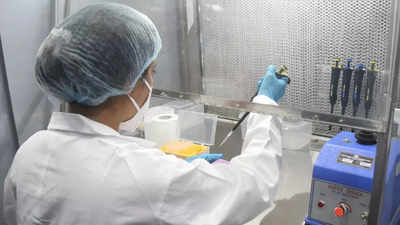- News
- City News
- delhi News
- Covid virus loses 90% power in 5 minutes after it’s exhaled, says study
Trending
This story is from January 13, 2022
Covid virus loses 90% power in 5 minutes after it’s exhaled, says study
How long does the coronavirus remain infectious once it is exhaled? Just five minutes. That is what an experimental study conducted by scientists at the University of Bristol in the UK suggests. The virus loses most of its infectivity within five minutes of its being converted into the form of particles small and light enough to be carried on the air.

An experimental study conducted by scientists at the University of Bristol in the UK suggests that Covid virus loses 90% power in 5 minutes after it’s exhaled. (TOI photo)
NEW DELHI: How long does the coronavirus remain infectious once it is exhaled? Just five minutes. That is what an experimental study conducted by scientists at the University of Bristol in the UK suggests. The virus loses most of its infectivity within five minutes of its being converted into the form of particles small and light enough to be carried on the air.
In 20 minutes, the infectivity of the virus goes down to 10% of the starting value, according to the pre-print study, which is yet to be peer-reviewed but has been published online on medRxiv.
The experiment involved a unique simulation technique in which samples of the coronavirus were placed in a special kit and an electric field employed to levitate the tiny droplets containing the virus for several minutes, like it would in normal air. Scientists adjusted the temperature, light and humidity and assessed the changes in the infectivity of the virus.
Coronavirus live updates
Public health specialists say the findings can have far-reaching consequences in terms of formulating steps to prevent the transmission of Covid-19. “The most important findings of this study are linked to the fact that in 20 min, there is 90% reduction in virus quantity and that relative humidity of 50 or lower contributes to reduced virus in settings,” said Dr Chandrakant Lahariya, an epidemiologist. “These findings are still non-peer reviewed. However, if these are further verified and scientifically validated, they would provide useful additional insights into improved ventilation for better protection from coronavirus transmission.”
Dr Pratibha Kale, associate professor of clinical microbiology at ILBS, said the manipulation of external factors, such as temperature and relative humidity, appear to help reduce the virus aerosol burden and can be adopted as a protection strategy. “This can be used in the aviation industry or schools, where there is a closed environment with high aerosol spread,” she said.
In 20 minutes, the infectivity of the virus goes down to 10% of the starting value, according to the pre-print study, which is yet to be peer-reviewed but has been published online on medRxiv.
The experiment involved a unique simulation technique in which samples of the coronavirus were placed in a special kit and an electric field employed to levitate the tiny droplets containing the virus for several minutes, like it would in normal air. Scientists adjusted the temperature, light and humidity and assessed the changes in the infectivity of the virus.
According to the published results, a decrease in infectivity at low relative humidity occurred almost immediately, falling to an average of 54% within 5 seconds of generation. “Interestingly, although the initial loss in infectivity at low RH is almost instant, the virus infectivity then remains more stable, only decreasing an average of 19% over the next 5 minutes. At high RH, the reduction in infectivity following aerosolisation is more gradual with a steady loss of infectivity of 48% within the first 5 minutes. The decay in survival appears to plateau at both RHs after 10 minutes,” the study says.
Coronavirus live updates
Public health specialists say the findings can have far-reaching consequences in terms of formulating steps to prevent the transmission of Covid-19. “The most important findings of this study are linked to the fact that in 20 min, there is 90% reduction in virus quantity and that relative humidity of 50 or lower contributes to reduced virus in settings,” said Dr Chandrakant Lahariya, an epidemiologist. “These findings are still non-peer reviewed. However, if these are further verified and scientifically validated, they would provide useful additional insights into improved ventilation for better protection from coronavirus transmission.”
Dr Pratibha Kale, associate professor of clinical microbiology at ILBS, said the manipulation of external factors, such as temperature and relative humidity, appear to help reduce the virus aerosol burden and can be adopted as a protection strategy. “This can be used in the aviation industry or schools, where there is a closed environment with high aerosol spread,” she said.
End of Article
FOLLOW US ON SOCIAL MEDIA










